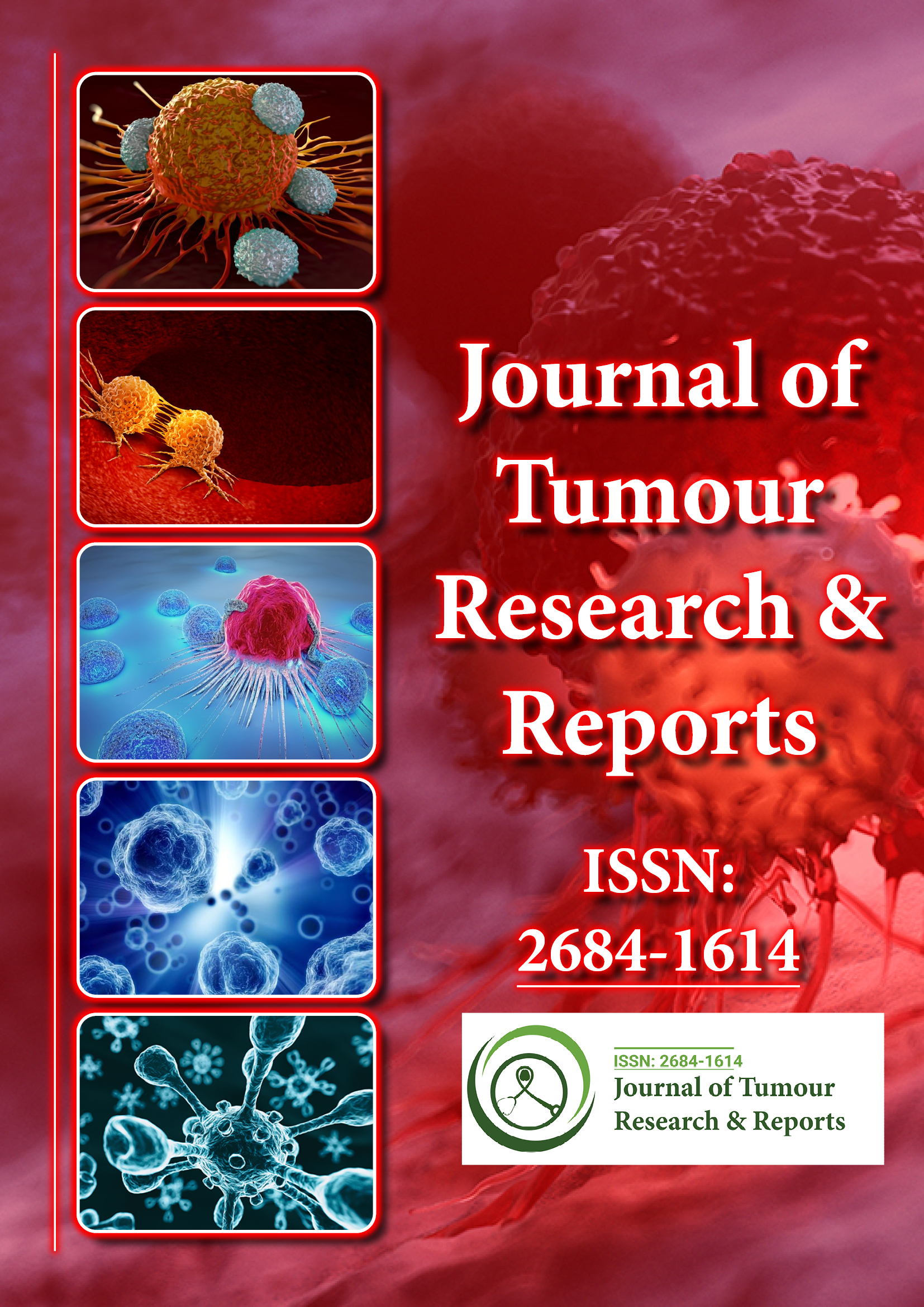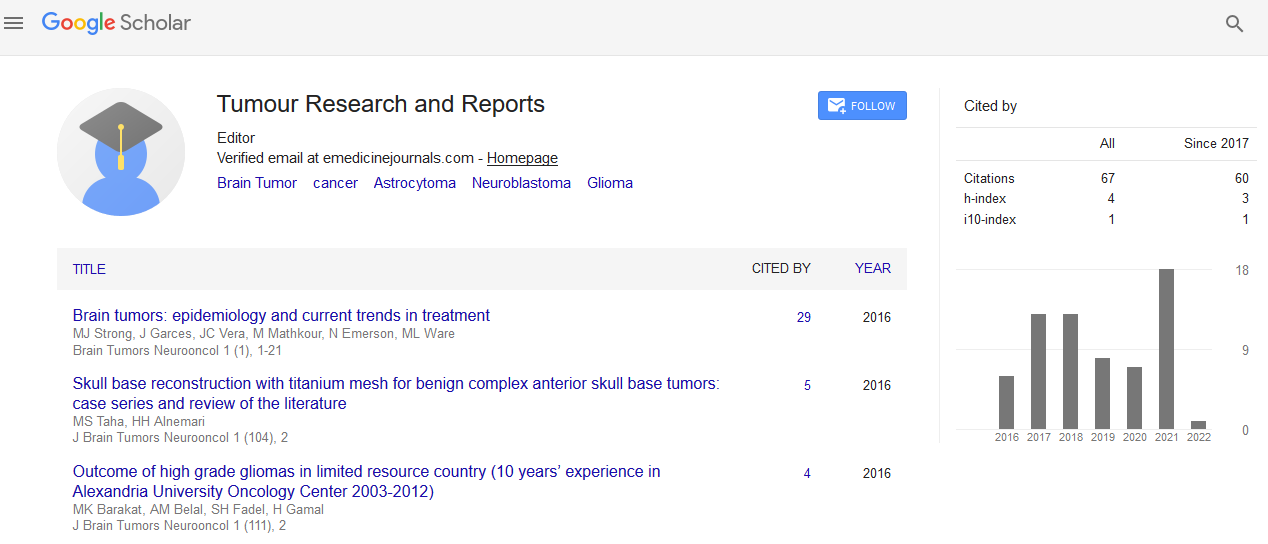Indexed In
- RefSeek
- Hamdard University
- EBSCO A-Z
- Google Scholar
Useful Links
Share This Page
Journal Flyer

Open Access Journals
- Agri and Aquaculture
- Biochemistry
- Bioinformatics & Systems Biology
- Business & Management
- Chemistry
- Clinical Sciences
- Engineering
- Food & Nutrition
- General Science
- Genetics & Molecular Biology
- Immunology & Microbiology
- Medical Sciences
- Neuroscience & Psychology
- Nursing & Health Care
- Pharmaceutical Sciences
Perspective - (2025) Volume 10, Issue 1
Epigenetic Modifications in Colorectal Cancer: Diagnostic Implications and Therapeutic Techniques
Lucia Moretti*Received: 03-Mar-2025, Manuscript No. JTRR-25-29024; Editor assigned: 05-Mar-2025, Pre QC No. JTRR-25-29024 (PQ); Reviewed: 19-Mar-2025, QC No. JTRR-25-29024; Revised: 26-Mar-2025, Manuscript No. JTRR-25-29024 (R); Published: 02-Apr-2025, DOI: 10.35248/2684-1614.25.10.252
Description
Colorectal Cancer (CRC) ranks among the most common malignancies worldwide, contributing significantly to cancer-related mortality. Although genetic mutations play a pivotal role in CRC initiation and progression, epigenetic modifications have emerged as equally important contributors. Unlike genetic alterations, epigenetic changes do not involve alterations in DNA sequence but influence gene expression through reversible chemical modifications such as DNA methylation, histone modification, and non-coding RNA regulation. The study of these mechanisms not only advances our understanding of CRC pathogenesis but also opens new avenues for early diagnosis, prognosis assessment, and therapeutic intervention.
DNA methylation is the most extensively studied epigenetic modification in CRC. Aberrant methylation patterns, particularly hypermethylation of CpG islands in gene promoter regions, lead to silencing of tumor suppressor genes. For example, hypermethylation of the MLH1 gene promoter is a hallmark of Microsatellite Instability (MSI)-high colorectal tumors and plays a critical role in the inactivation of DNA mismatch repair pathways. Similarly, genes such as CDKN2A (p16), APC, and SFRP1 frequently undergo promoter hypermethylation, contributing to cell cycle dysregulation, Wnt pathway activation, and tumor initiation.
In contrast, global hypomethylation of DNA, often observed in repetitive DNA sequences and intergenic regions, promotes genomic instability and can activate oncogenes. This dual epigenetic phenomenon—localized hypermethylation and global hypomethylation—reflects the complexity and diversity of epigenetic regulation in colorectal tumorigenesis.
Histone modifications, including acetylation, methylation, phosphorylation, and ubiquitination, also modulate chromatin structure and gene expression. Histone acetylation generally enhances transcription by loosening chromatin, while deacetylation leads to gene repression. Histone Deacetylases (HDACs) are frequently overexpressed in CRC and are associated with poor prognosis and resistance to therapy. HDAC inhibitors such as vorinostat and romidepsin have shown promising preclinical activity in CRC models, particularly when used in combination with chemotherapy or immunotherapy.
Non-coding RNAs (ncRNAs), particularly microRNAs (miRNAs) and long non-coding RNAs (lncRNAs), are emerging regulators of gene expression in colorectal cancer. miR-34a, a well-known tumor suppressor miRNA, is often downregulated in CRC due to promoter methylation, leading to upregulation of its target oncogenes. On the other hand, miR-21, an oncomiR, is consistently overexpressed and promotes cell proliferation, invasion, and metastasis by targeting tumor suppressor genes such as PTEN and PDCD4. LncRNAs like HOTAIR and MALAT1 are also dysregulated in CRC and play roles in chromatin remodeling, transcriptional regulation, and metastasis promotion.
The clinical implications of these epigenetic changes are profound. Epigenetic biomarkers offer non-invasive, highly sensitive tools for early detection of colorectal cancer. Methylated SEPT9 in plasma DNA has been approved as a blood-based screening test for CRC and shows promise for detecting early-stage disease. Stool DNA tests incorporating methylation markers such as SFRP2 and VIM have also demonstrated improved sensitivity and specificity compared to traditional fecal occult blood tests.
In addition to diagnosis, epigenetic profiling aids in risk stratification and prognosis. For instance, CRC patients with a CpG Island Methylator Phenotype (CIMP) exhibit distinct clinical and pathological features, including proximal tumor location, poor differentiation, and frequent BRAF mutations. These tumors often respond differently to chemotherapy and may benefit from tailored treatment approaches.
Epigenetic therapies aim to reverse abnormal gene silencing and restore normal gene expression. DNA Methyltransferase Inhibitors (DNMTis), such as azacitidine and decitabine, have shown limited success as monotherapies in CRC but may enhance the efficacy of other treatments. Emerging evidence suggests that DNMTis sensitize tumor cells to immune checkpoint blockade by upregulating endogenous retroviruses and increasing tumor immunogenicity. This has spurred interest in combination therapies involving epigenetic agents and immunotherapy, particularly for patients with Microsatellite Stable (MSS) CRC who typically do not respond well to immunotherapy alone.
Moreover, targeting specific epigenetic modifiers presents new opportunities for drug development. Inhibitors of EZH2, a histone methyltransferase that catalyzes H3K27me3 and represses tumor suppressor genes, are under investigation for their anti-tumor activity in colorectal and other cancers. BET inhibitors, which block the function of bromodomain proteins involved in reading acetylated histones, have also shown efficacy in preclinical CRC models by downregulating MYC and other oncogenes.
Citation: Moretti L (2025). Epigenetic Modifications in Colorectal Cancer: Diagnostic Implications and Therapeutic Techniques. J Tum Res Reports. 10:252.
Copyright: © 2025 Moretti L. This is an open-access article distributed under the terms of the Creative Commons Attribution License, which permits unrestricted use, distribution, and reproduction in any medium, provided the original author and source are credited.

